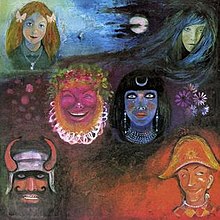
Thom Harmand writes ...
Greg Lake, Ian McDonald, and Michael Giles from King Crimson - The lineup (except for Fripp and lyricist Pete Sinfield) was in flux for awhile.:
From Wilipedia:
After their first US tour, King Crimson was in a state of flux with various line-up changes, thwarted tour plans, and difficulties in finding a satisfactory musical direction. This period has subsequently been referred to as the "interregnum
" – a nickname implying that the "King" (King Crimson) was not properly in place during this time.
Fripp became the only remaining musician in the band, with Sinfield expanding his creative role to playing synthesizers.
Fripp and Sinfield recorded the second King Crimson album, In the Wake of Poseidon, in 1970 with the Giles brothers hired back as the session rhythm section, and with jazz pianist Keith Tippett and Circus saxophonist Mel Collins as guest musicians. The group considered hiring Elton John
to be the singer, but decided against the idea.
Lake then agreed to sing on the album in exchange for receiving King Crimson's PA equipment, except on "Cadence and Cascade", which is sung by Fripp's friend Gordon Haskell
. Though Tippett was offered band membership, he preferred to remain as a studio collaborator, performing with the band for a single gig.
Upon its release in May 1970, In the Wake of Poseidon reached No. 4 in the UK and No. 31 in the US. It received some criticism from those who thought it sounded too similar to their first album.
With no musicians to perform material from their new album, Fripp and Sinfield persuaded Haskell to join as singer and bassist and recruited Andy McCulloch
as drummer, retaining Collins as saxophonist, flutist and occasional keyboard player.
During the writing sessions for the third album, Lizard, Haskell and McCulloch had no say in the direction of the material, since Fripp and Sinfield wrote the album themselves, bringing in Tippett, Mark Charig on cornet, Nick Evans on trombone, and Robin Miller on oboe and cor anglais as additional musicians. Haskell sang and played bass. Jon Anderson of Yes
was also brought in to sing the first part of the album's title track, "Prince Rupert Awakes", which Fripp and Sinfield considered to be outside Haskell's range and style.
Lizard featured stronger avant-garde jazz and chamber-classical influences than previous albums, as well as Sinfield's upfront experiments with processing and distorting sound through the EMS VCS 3 synthesiser. It also featured complex lyrics from Sinfield, including a coded song about the break-up of the Beatles
, with almost the entire second side taken up by a predominantly instrumental chamber suite describing a medieval battle and its outcome. Released in December 1970, Lizard reached No. 29 in the UK and No. 113 in the US. Described retrospectively as an "acquired taste", Lizard was certainly not to the taste of the more rhythm-and-blues-oriented Haskell and McCulloch, both of whom found the music difficult to relate to. As a result, Haskell quit the band acrimoniously after refusing to sing live with distortion and electronic effects. McCulloch also departed, leaving Fripp and Sinfield to recruit new members once more.
CAPTAIN BEYOND:
Drummer Bobby Caldwell, who had formed the band quit after their first album and subsequent tour ( I saw them open for label mates The Allman Brothers in 1972.
After their 2nd album, “Sufficiently Breathless” was released, singer Rod Evans quit.
THE DB’S: Guitarist and songwriter Chris Stamey left the band after their first 2 brilliant albums, ‘Stands For Decibels’ and ‘Repercussion’.
Big Star: Co-founder, guitarist and songwriter Chris Bell left the band after the failure of the band’s first album to chart ( due to poor distribution by Stax, parent company of the band’s label, Ardent Records. The band carried on as a trio, but after their second album, ‘Radio City’ was released, bassist Andy Hummel left the band.






